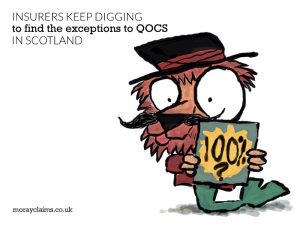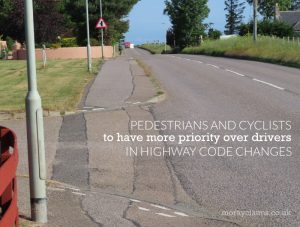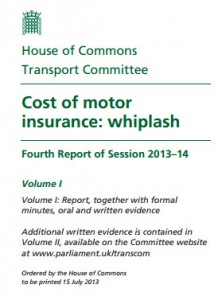The default position under Qualified One-way Costs Shifting (QOCS) for personal injury compensation claimants in Scotland is this. If your claim succeeds, you will be able to recover legal costs from your opponent, in addition to the compensation agreed as payable or as awarded to you by a court. Whether you lose any of your compensation to pay a success fee will depend upon the arrangement you have with your solicitor. If your claim is unsuccessful, QOCS should mean that you DO NOT have pay legal costs to your opponent - even though the normal rule is “loser pays”. That is what “one-way costs shifting” means. There’s a shift in the usual costs rule in favour of the loser if they are claimant; but not if they are the claimant’s opponents (usually an insurance company). QOCS arrived in England and Wales (2013) before it came to Scotland (2021). To some extent, Scotland has been learning from the experience south of the Border. In 2023, there have been some Continue Reading
Pedestrians and cyclists to have more priority over drivers in Highway Code changes
Walking and cycling have become more popular during the pandemic. So-called “active travel” has benefits for personal health as well as the environment. Department for Transport figures show that, over the last year, there’s been a 46% increase in the number of miles cycled on British roads. Tellingly, that’s a larger increase than in all of the previous 20 years combined. To take even one corner of Moray as an example... While the Lossiemouth - Elgin cycle path beside the A941 has been an active travel benefit for many years, the long-mooted track to connect Lossiemouth to Hopeman has only recently gained significant traction, despite years of campaigning. Now that the charitable organisation (SCIO) Laich of Moray Active Travel Routes is in existence, and with help from Sustrans, a connection between Lossiemouth and Covesea is coming. Hopefully, the final link from Covesea to Hopeman - to cover places such as the Green Road, Gordonstoun and Duffus - will not be far Continue Reading
How Insurance Disclosure Reform Can Help Your Claim Succeed (And Save You Money)
Consumer claims on home and other insurance policies should now succeed more easily We’re now just over a year into a new legal framework which could benefit you, as a consumer, if you have to make a claim on insurance and your insurer refuses to honour it. The range of consumer insurance policies affected is very wide indeed. In our experience, most people have a wrangle with an insurance company sooner or later. This change to the law is something worth bearing in mind if you find yourself in dispute with an insurer over a claim you have made on a policy. The fatal mistake – failure to disclose Typically, the scenario is one where your insurer says that, at the time you took out the insurance (or renewed it), you failed to tell them about some important fact which would have influenced the level of premium – or even whether they would have agreed to insure you at all. In those circumstances, the insurer would refuse to pay out on your claim, or could impose Continue Reading
Whiplash Injury: UK Insurers Told By MPs To Sort Out Their Practices
MPs consider the effect of whiplash claims on motor insurance premiums The UK Parliament’s Cross-Party Transport Select Committee published its report “Cost of Motor Insurance: Whiplash” on 31 July 2013. The Westminster Government’s perception is that there is an increasing number of whiplash personal injury claims following road traffic accidents – some of which are invented by the supposed victims and, even where genuinely-based, the extent of the injury is often exaggerated. In the Government’s eyes, this is pushing up the cost of motor insurance. The Government has described the UK as “the whiplash capital of the world”. The Select Committee considered these issues as part of its remit. What is Whiplash and Why is it Problematic? The definition for whiplash used by the Committee was: “The neck pain which occurs after the soft tissue in the spine has been stretched and strained when the body is thrown in a sudden, forceful jerk.” This is a typical result of the Continue Reading
Car Insurance: When the “Best Deal” may be False Economy (If In Doubt – Disclose)
When you’re insuring your car, you’re looking for the best deal and that usually means the cheapest deal. In that environment, it is easy to think that a little 'white lie' about your vehicle or your circumstances will not hurt you if it saves you a few pounds. That is a risky and inadvisable approach, as a recent decision from Greenock Sheriff Court illustrates. The claimant in that case had insured his Audi with Zenith Insurance. When the vehicle was stolen, he claimed on his car insurance for the value of the vehicle. The claim was refused. Zenith said they were treating his policy as void. They refunded the premiums he had paid (amounting to about £1,440) but refused to pay him the value of his car (about £20,000). He sued Zenith for payment of the value of the car. He lost. Insurance contracts are contracts of the utmost good faith Basically, this means that you, as the insured, have a duty to disclose all material or “important” facts that might have Continue Reading




